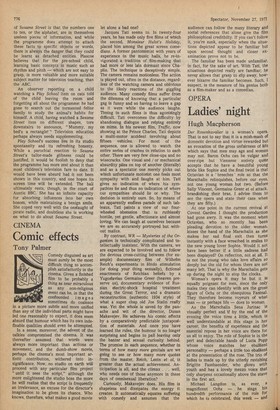CINEMA
Comic effects
Tony Palmer
Comedy disguised as art must surely be the most difficult thing to accomplish satisfactorily in the cinema. Given a finished film to be probably: a thing as near miraculous as any non-religious event can be, in that the confounded images sometimes do coalesce in a picture more subtle and more unified than any of the individual parts might have led one reasonably to expect, it does seem absurd that humour which has its own indefinable qualities should even be attempted.
In a sense, moreover, the advent of the talkies compromised the cinema. It was thereafter assumed that words were always more important than actions or movement, and the dumb-show movie, perhaps the cinema's most important artistic contribution, withered into insignificance. Now, no studio on earth will proceed with any particular film project "until it sees the script," although the more enlightened the studio boss the more he will realise that the script is frequently an irrelevance, an excuse for the 'director's imagination to be given its chance. Who knows, therefore, what makes a good movie let alone a bad one?
Jacques Tati seems to. In twenty-four years, he 'has made only live films of which the second, Monsieur Hulot's Holiday, placed him among the great screen comedians. A former pantomimist with years of experience in the music halls, •he re-invigorated a tradition of film-making that had more or less lain dormant since Chaplin. The technique is deceptively simple. The camera remains motionless. The action is played out, often in the distance, regardless of the watching camera and oblivious to the likely reactions of the giggling audience. Many comedy films suffer from the dilemma of knowing that a particular gag is funny and so having to leave a gap as it were while the audience laughs. Timing in such films is thus agonisingly difficult. Tati overcomes the difficulty by abandoning dialogue and relying entirely on mime. In his newest film, Traffic, now showing at the Prince Charles, Tati depicts a multi-motor accident involving about fifteen vehicles. For most of the sequence, one is allowed to watch the entire series of crashes in relation to each other. There are very few close-ups and no wisecracks. One visual and / or mechanical absurdity piles on top of another (literally) and as a spectator one merely picks out which unfortunate motorist one feels most sympathy with and laughs at him. Tati gives no indication of where his sympathies lie and thus no indication of where our sympathies should lie or why. The decilsion is entirely ours. So, by means of an apparently endless parade of such tableaux, Tad paints a view of our fourwheeled obsession that is ruthlessly hostile, yet gentle, affectionate and almost loving. We can laugh at ourselves because we are so accurately portrayed but without malice.
By contrast, WR — Mysteries of the Organism is technically complicated and intellectually insistent, With the camera, we are expected to be involved and to follow the devious cross-cutting between (for example) documentary film of Wilhelm Reich's experiments in libido stimulation (or doing your thing sexually), fictional enactments of Reichian beliefs by a Yugoslavian Germaine Greer (heaven preserve us), documentary evidence of Russian electric-shock hospital treatment during the Great Terror, and a dramatic reconstruction (authentic 1934 style) of what a super chap old Joe Stalin really was. Yet the whole is saved by the panache and wit of the director, Dusan Makavejev. He achieves his comic effects by a comparatively predictable juxtaposition of materials. And once you have learned the rules, the 'humour is no longer surprising 'and begins to pall leaving only the banter and sexual curiosity behind. The promise in each sequence, whether in terms of how many more genitals are we going to see or how many more quotes from the master, Reich, Lenin et al, is greater than the actual achievement. Anticipation is all, and the climax . . , well, who needs one of those anymore in these days of omnisexual liberation?
Curiously, Makavejev does. His film is shapeless and dissipates the energy it creates. It automatically equates suffering with comedy and assumes that the audience can follow the many literary and social references that alone give the film philosophical creditbilty. If you can't follow it, you're sunk, especially when the situations depicted appear to be familiar but upon second thought and closer examination prove not to be.
The familiar has been made unfamiliar, in fact, for the sake of art. With Tati, the situations depicted really are familiar; he never allows that grasp to slip away, however bizarre the familiar becomes. Such, I suspect, is the measure of his genius both as a film-maker and as a comedian.














































 Previous page
Previous page